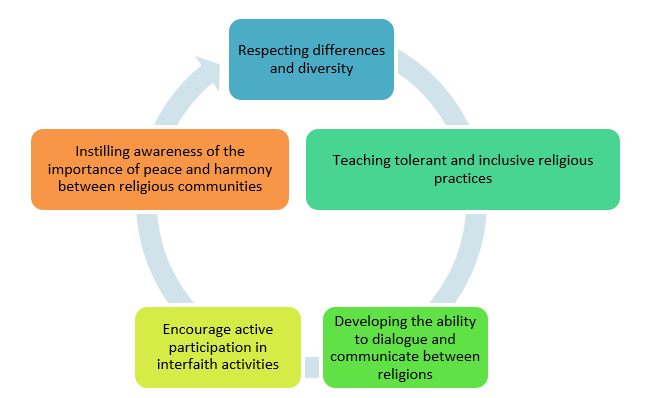Evaluation of the Implementation of Religious Moderation with the CIPP Model: Moderate Character of High School Students
DOI:
https://doi.org/10.51574/ijrer.v4i4.3587Keywords:
CIPP Model, High School Students, Moderate Character, Religious ModerationAbstract
Religious moderation is a moderate view on religion. The government has made religious moderation a national policy to organize and harmonize Indonesia's heterogeneous religious life. Educational institutions are key to strengthening this program. Evaluation is necessary to make educational religious moderation initiatives more quantitative and targeted. This study aims to evaluate the implementation of the religious moderation program at the public high school. This study uses a qualitative approach with the CIPP evaluation model. This research was conducted at the Public High School 7 Wajo. Data collection was carried out using interview, observation, and documentation techniques. Data analysis techniques used the interactive model from Miles and Huberman. The techniques used for checking data validity included triangulation methods. The findings indicate that Public High School 7 Wajo is effectively implementing religious moderation in a comprehensive way, as seen in their Education Unit Curriculum document, regular classes, extracurricular activities, daily practices, school policies, and interfaith student groups. The CIPP evaluation shows that the program is going well and should be continued with improvements. The evaluation results indicate that the program has run well: a clear legal basis, program objectives that meet program recipients' needs, principal support, cooperation with the Wajo Regency Interfaith Harmony Forum, utilizing opportunities to become advantages, ignoring obstacles so that program implementation runs continuously and sustainably, and successfully forming moderate student character.
References
Ahmadi, A., & Afifah, N. (2022). Penanaman Nilai-Nilai Moderasi Beragama Melalui Pendidikan Agama Islam (PAI) Di Madrasah Ibtidaiyah (MI). Kartika: Jurnal Studi Keislaman, 2(2), 128–141. https://doi.org/10.59240/kjsk.v2i2.12
Alanshori, M. Z., Maulidi, A., Muhlisin, A., Kusaeri, K., & Suparto, S. (2025). The Application of the CIPP Evaluation Model in Educational Programs in Indonesia. Scaffolding: Jurnal Pendidikan Islam dan Multikulturalisme, 7(2), 103-122. https://doi.org/10.37680/scaffolding.v7i2.7390
Alfajri, A., & Pito, A. H. (2021). Regresi Moderasi dan Narasi Keagamaan di Sosial Media. Andragogi: Jurnal Diklat Teknis Pendidikan Dan Keagamaan, 9(2), 136–153. https://doi.org/10.36052/andragogi.v9i2.237
Aluf, W. Al, Bukhori, I., Bashith, A., Islam, U., Maulana, N., & Ibrahim, M. (2024). Evaluasi Pembelajaran Moderasi Beragama untuk Mengukur Penguatan Toleransi Siswa di MIN 2 Pamekasan. 4, 1623–1634. https://doi.org/10.53299/jppi.v4i4.825
Arifinsyah, A., Andy, S., & Damanik, A. (2020). The urgency of religious moderation in preventing radicalism in Indonesia. ESENSIA: Jurnal Ilmu-Ilmu Ushuluddin, 21(1), 91-108. https://doi.org/10.14421/esensia.v21i1.2199
Aristya, S. (2023). CIPP: Implementasi Model Evaluasi Pendidikan. Jurnal Evaluasi Dan Pembelajaran, 5(1), 1–72. https://jepjurnal.stkipalitb.ac.id/index.php/hepi/article/view/84
Azis, A., & Setlight, M. M. M. (2023). Analisis Penerapan Sikap Moderasi Beragama Pada Masyarakat. Jurnal Tana Mana, 4(2), 59-68. https://doi.org/10.33648/jtm.v4i2.382
Basaran, M., Dursun, B., Gur Dortok, H. D., & Yilmaz, G. (2021). Evaluation of Preschool Education Program According to CIPP Model. Pedagogical Research, 6(2).
Basyir, K. (2020). Fighting islamic radicalism through religious moderatism in Indonesia: An analysis of religious movement. ESENSIA: Jurnal Ilmu-Ilmu Ushuluddin, 21(2), 205-220. https://doi.org/10.14421/esensia.v21i2.2313
Bhakti, B. Y. (2021). Evaluasi Program Model CIPP Pada Proses. Jurnal Inovasi Pendidikan Fisika Dan Riset Ilmiah, 1(2), 75–82. https://doi.org/10.30599/jipfri.v1i2.109
Dizon, A. G. (2023). Historical development of CIPP as a curriculum evaluation model. History of Education, 52(1), 109-128. https://doi.org/10.1080/0046760X.2022.2098390
Fitriani, Y. dkk. (2024). Evaluasi Program Tahfidz Kurikulum Utrujah Menggunakan Model CIPP pada Sekolah Islam Markaz Ashabul Qur’an. An-Nahdlah: Jurnal Pendidikan Islam, 4, 69–77. https://doi.org/10.51806/an-nahdlah.v4i1.135
Gunawan, H., Ihsan, M. N., & Jaya, E. S. (2021). Internalisasi Nilai-Nilai Moderasi Beragama Dalam Pembelajaran PAI Di SMA Al-Biruni Cerdas Mulia Kota Bandung. Atthulab Islamic Religion Teaching and Learning Journal, 6(1), 14–25. https://doi.org/10.15575/ath.v6i1.11702
Harmi, H. (2022). Analisis Kesiapan Program Moderasi Beragama Di Lingkungan Sekolah/Madrasah. Jpgi (Jurnal Penelitian Guru Indonesia), 7(1), 89. https://doi.org/10.29210/021748jpgi0005
Hisyam, M., & Hasan, M. (2025). Evaluating the SAVA System as a Digital-Based Quality Strategy in Islamic Schools: A CIPP Model Approach. Management of Education: Jurnal Manajemen Pendidikan Islam, 11(2), 223-232. https://doi.org/10.18592/moe.v11i2.17412
Huang, S. H. (2025). Evaluating the English for General Purposes (EGP) program at a Taiwanese University: A CIPP (context, input, process, and product) model study. Evaluation and Program Planning, 102662. https://doi.org/10.1016/j.evalprogplan.2025.102662
Huda, M. (2024). Strengthening religious moderation through the core values of Islamic boarding school education. Al-Hayat: Journal of Islamic Education, 8(1), 59-71. https://www.alhayat.or.id/index.php/alhayat/article/view/458
Khalil, Y. S. H., Zubair, M., & Mareta, M. (2024). Pengembangan potensi peserta didik berbasis nilai dalam membentuk generasi unggul melalui multiple intelligence. Jurnal Ilmiah Profesi Pendidikan, 9(4), 3037-3048. https://doi.org/10.29303/jipp.v9i4.2948
Khasanah, N., Hamzani, A. I., & Aravik, H. (2023). Religious moderation in the Islamic education system in Indonesia. Qalamuna: Jurnal Pendidikan, Sosial, dan Agama, 15(1), 629-642. https://doi.org/10.37680/qalamuna.v15i1.4115
Khosyiin, M. I., & Fakhruddin, M. (2022). Evaluasi Program Pelatihan Model Kirkpatrick. Cermin: Jurnal Manajemen Dan Pendidikan Berbasis Islam Nusantara, 1 (2), 42-46.
Lippe, M., & Carter, P. (2018). Using the CIPP model to assess nursing education program quality and merit. Teaching and Learning in Nursing, 13(1), 9-13. https://doi.org/10.1016/j.teln.2017.09.008
Mukhibat, M., Effendi, M., Setyawan, W. H., & Sutoyo, M. (2024). Development and evaluation of religious moderation education curriculum at higher education in Indonesia. Cogent Education, 11(1), 2302308. https://doi.org/10.1080/2331186X.2024.2302308
Muthia, A., Sultan, M. I., & Latief, D. (2024). Website Kemenag.co.id Sebagai Strategi Komunikasi Publik Dalam Menyebarluaskan Program Moderasi Beragama. Jurnal Penelitian Inovatif, 4(2), 354–360. https://doi.org/10.54082/jupin.302
Nurhakim, H. A., & Fahruddin. (2022). Evaluasi Program Pembelajaran Sejarah Daring Dengan Model Cipp. Jurnal Evaluasi Pendidikan, 13(2), 111–118. https://doi.org/10.21009/jep.v13i2.27456
Nurlaili, N., Fitriana, F., Millah, C. U., & Nasution, E. M. (2024). Moderasi beragama di Indonesia: Konsep dasar dan pengaruhnya. Moderation: Journal of Religious Harmony, 1(1), 19-24. https://doi.org/10.47766/moderation.v1i1.2707
Pološki Vokić, N., & Aleksić, A. (2020). Are active teaching methods suitable for all generation Y students?—Creativity as a needed ingredient and the role of learning style. Education Sciences, 10(4), 87. https://doi.org/10.3390/educsci10040087
Rama, A., Ambiyar, A., Rizal, F., Jalinus, N., Waskito, W., & Wulansari, R. E. (2023). Konsep model evaluasi context, input, process dan product (CIPP) di sekolah menengah kejuruan. JRTI (Jurnal Riset Tindakan Indonesia), 8(1), 82. https://doi.org/10.29210/30032976000
Ratnay, G., Indriaswuri, R., Widayanthi, D. G. C., Atmaja, I. M. P. D., & Dalem, A. A. (2022). CIPP Evaluation Model for Vocational Education: A Critical Review. Education Quarterly Reviews, 5(3), 1-8.
Rocha, A. C., Silva, M., & Duarte, C. (2022). How is sexuality education for adolescents evaluated? A systematic review based on the Context, Input, Process and Product (CIPP) model. Sex Education, 22(2), 198-216. https://doi.org/10.1080/14681811.2021.1908984
Rofik, M. N., & Misbah, M. (2021). Implementasi Program Moderasi Beragama yang Dicanangkan oleh Kementerian Agama Kabupaten Banyumas di Lingkungan Sekolah. Lectura: Jurnal Pendidikan, 12(2), 230-245. https://doi.org/10.31849/lectura.v12i2.7611
Salsabila, F. adiba. (2024). Model Conteks, Input, Proses Dan Produk (CIPP) Dalam Evaluasi Bimbingan Dan Konseling: Studi Tinjauan Pustaka. G-Couns: Jurnal Bimbingan Dan Konseling, 9(1), 636–646. https://doi.org/10.31316/gcouns.v9i1.6281
Sholikah, S. A. (2022). Evaluasi Penerapan Moderasi Beragama Terhadap Sikap Beragama Peserta Didik Di Smp Pgri Kecamatan Ngraho Kabupaten Bojonegoro. Evaluasi: Jurnal Manajemen Pendidikan Islam, 6(1), 107–127. https://doi.org/10.32478/evaluasi.v6i1.863
Surtini, S., & Muhtar, T. (2024). Teachers' pedagogic competence in strengthening character education of students in elementary schools: Exploring effective strategies. Jurnal Paedagogy, 11(3), 568-579. https://doi.org/10.33394/jp.v11i3.11904
Suryani, A., & Muslim, A. B. (2024). Religious tolerance at school and democratic education. In Embracing Diversity: Preparing Future Teachers to Foster Religious Tolerance (pp. 81-99). Singapore: Springer Nature Singapore. https://doi.org/10.1007/978-981-97-1616-6_5
Tamarin, V., & Hidayat, N. (2025). Implementation of Religious Moderation Values in Shaping the Social Character of Elementary School Students. al-Afkar, Journal For Islamic Studies, 8(1), 182-194. https://doi.org/10.31943/afkarjournal.v8i1.1358
Toosi, M., Modarres, M., Amini, M., & Geranmayeh, M. (2021). Context, Input, Process, and Product Evaluation Model in medical education: A systematic review. Journal of education and health promotion, 10(1), 199. https://pmc.ncbi.nlm.nih.gov/articles/PMC8249974/
Yusnarita, R. (2020). Model Evaluasi Kirkpatrick Pada Diklat Fungsional Calon Kepala Madrasah Di Pusdiklat Tenaga Teknis Pendidikan Dan Keagamaan (Master's thesis, Jakarta: FITK UIN Syarif Hidayatullah Jakarta).

Downloads
Published
How to Cite
Issue
Section
License
Copyright (c) 2025 Hamzah Alias, Sitti Mania, Muhammad Nur Akbar Rasyid

This work is licensed under a Creative Commons Attribution-ShareAlike 4.0 International License.









1.png)













